Think big: 6'9", 396-pound Daniel Faalele has coaches drooling—and he's never played a down

This story appears in the March 6, 2017, issue of SPORTS ILLUSTRATED. To subscribe, click here.
As the IMG Academy football team practiced one sweltering day last August, its newest member arrived after a very long trip. With 22 seniors who would earn scholarships to FBS schools, the academy players were a hard bunch to impress. They'd heard tales of this Australian who had never played football, a high school junior who stood 6'9", wore size-18 shoes and weighed a few plates of his beloved pasta shy of 400 pounds. But they'd believe it when they saw it. "Urban legend," IMG coach Kevin Wright recalls thinking when he first heard tell of the young Aussie.
Then Daniel Faalele walked onto the field, and practice stopped.
Seeing Faalele in the flesh can yield one of two radically different impressions: When he's by himself, he looks smaller than advertised because he's so well-proportioned; when he's alongside a normal-sized human being, he looks even more massive than his dimensions would suggest. It's as if someone fed the size of the ideal NFL offensive tackle into a 3D printer and set the output to 120%. The Ascenders stared as their coach walked over to chat and it became clear that this was one mountain of a person. "I was expecting a blob," recalls offensive lineman Curtis Dunlap, who's 6'5" and 370 pounds. "He's like a brick wall."
"Keep practicing," Wright barked. When Wright didn't hear any pads popping, he looked back. "The kids didn't do anything," Wright says. "They just kept looking." So Wright called them over. Evan Neal, a 6'8", 372-pound member of the class of 2019, later told Wright that he'd never met someone who was his own age but bigger.
The search for the next Tyler Lockett: Four prospects who will exceed their NFL draft stock
The college coaches who glimpsed Faalele during the most recent recruiting period reacted with similar awe. The 17-year-old Faalele (Fa-ah-lay-lay) has yet to play a down, but he already has scholarship offers from Alabama, Arkansas, Auburn, Florida State, Hawaii, Miami, Michigan and Oregon State. This spring college assistants will descend on Bradenton, Fla., to evaluate the buffet of blue-chippers on IMG's practice field. But their eyes will stop on number 72, who plans to enroll in January 2018. "Freak," says one Power 5 head coach. When Clemson defensive coordinator Brent Venables visited this winter, he asked Faalele to stand next to a door for a photo. Why? Venables worried his fellow coaches wouldn't believe how big Faalele was without a basis for comparison.
More offers will come, even though Faalele is in no position to weigh them. "He doesn't know the difference between Alabama and West Alabama," IMG offensive line coach Derrick Elder says.
He's about to learn.
*****
The Big Aussie: Daniel Faalele
Daniel Faalele
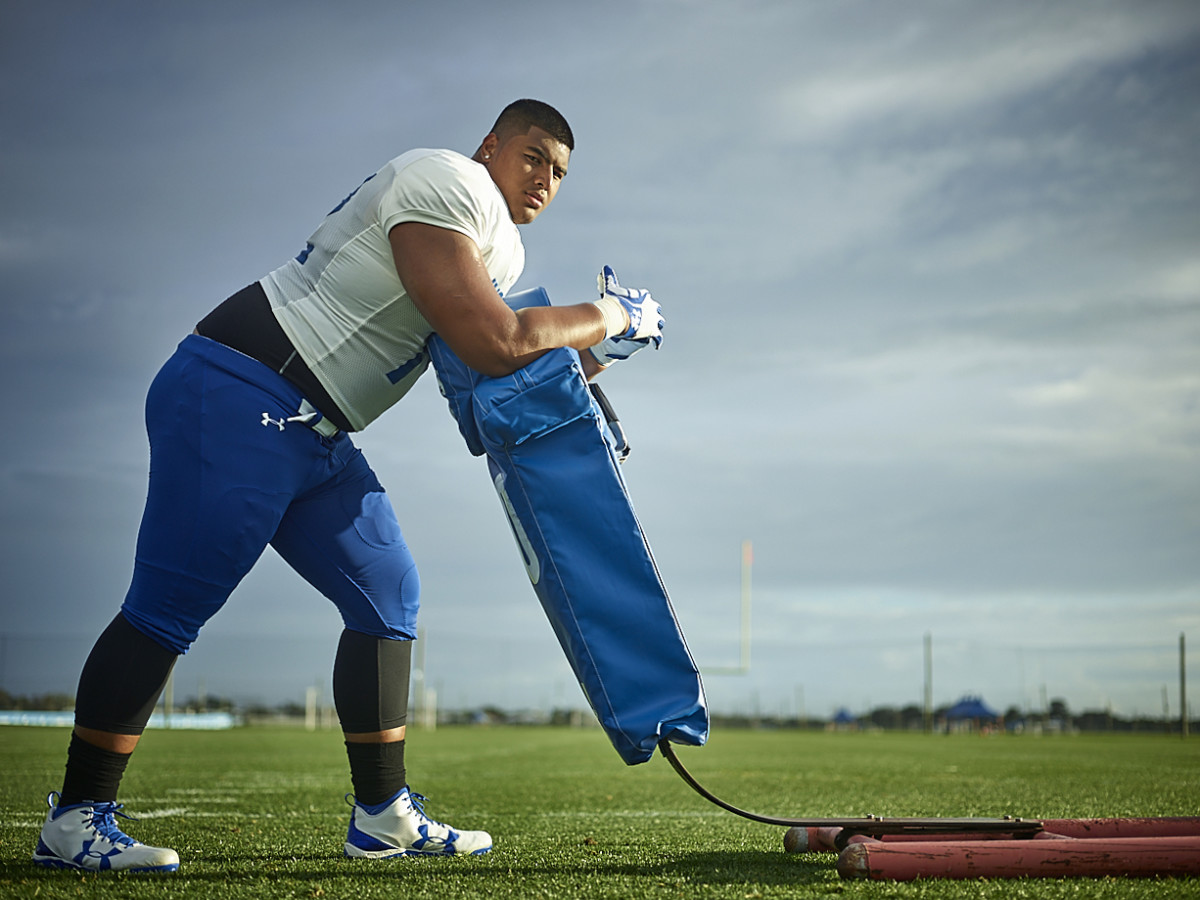
Daniel Faalele
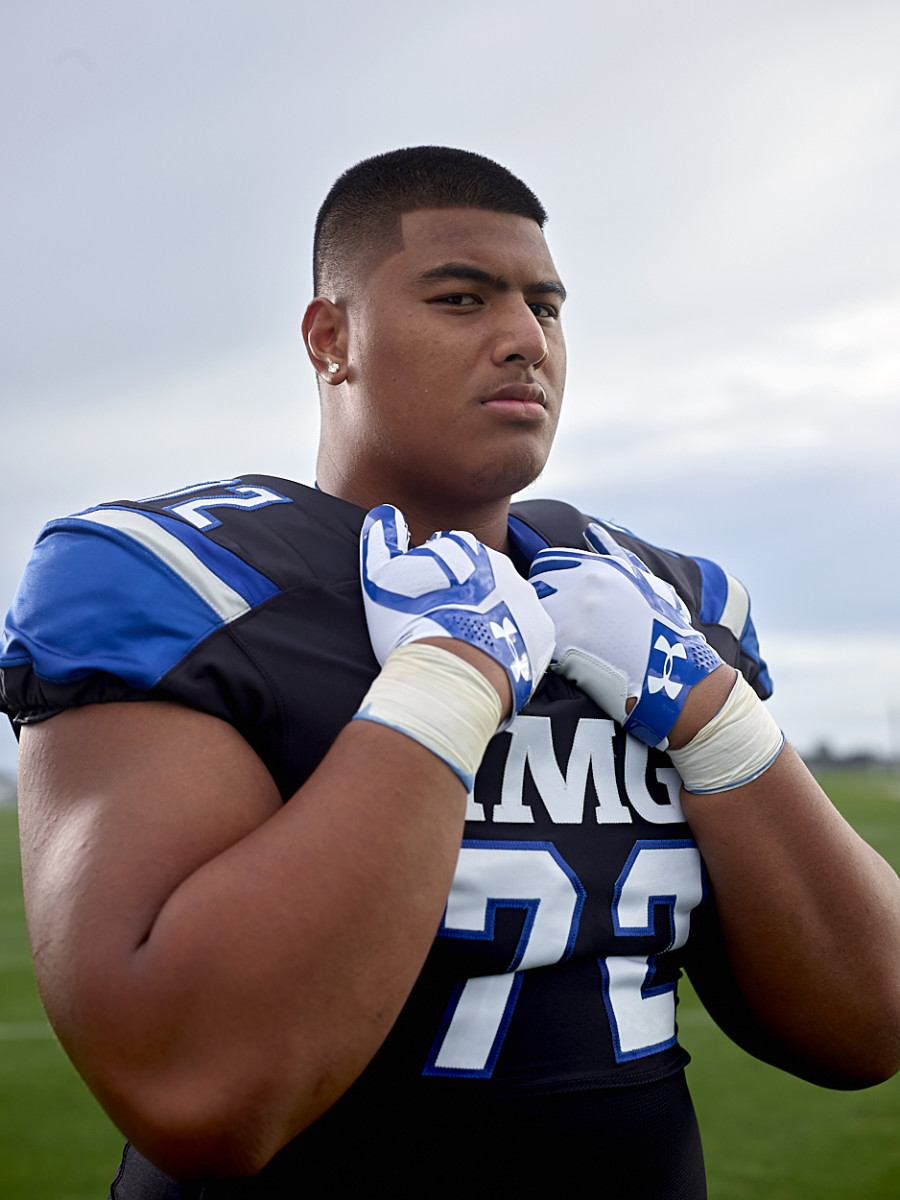
Daniel Faalele
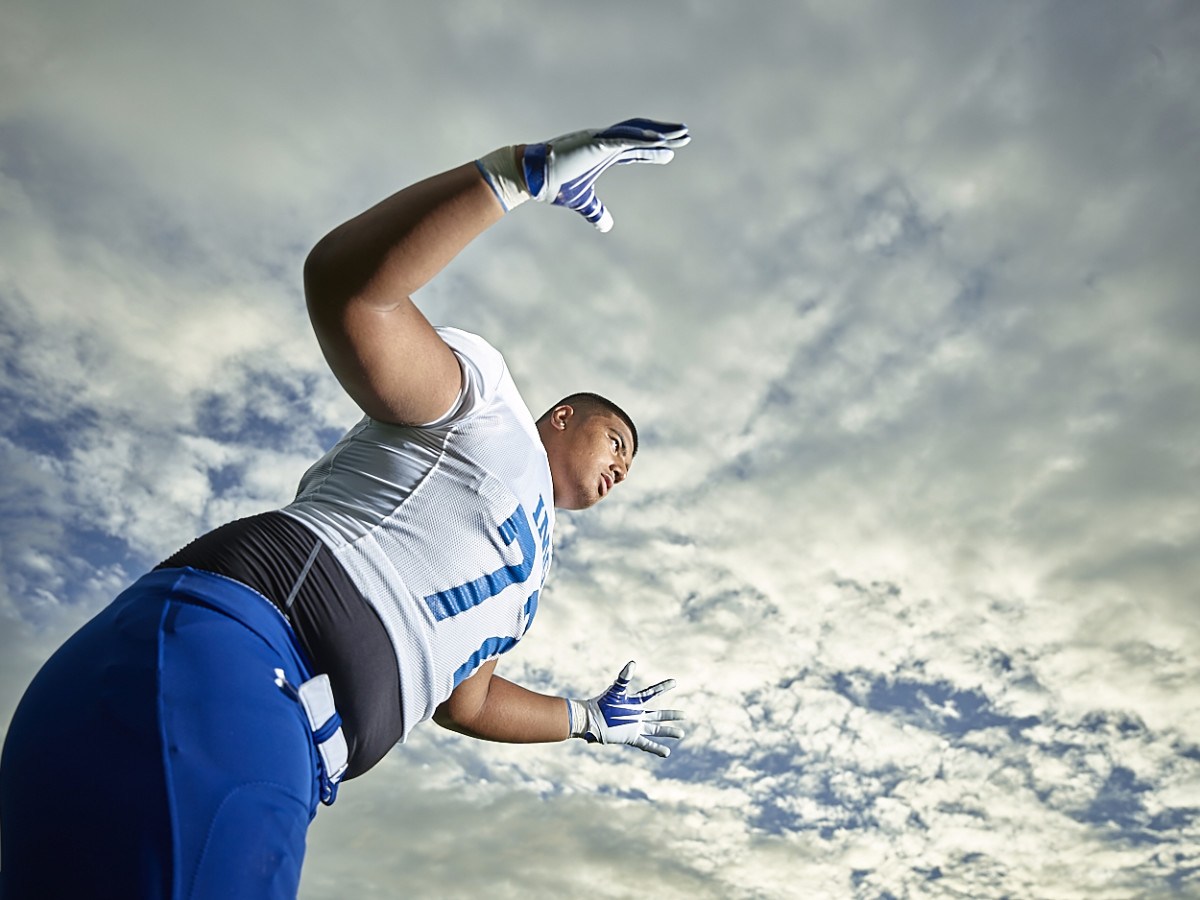
Daniel Faalele
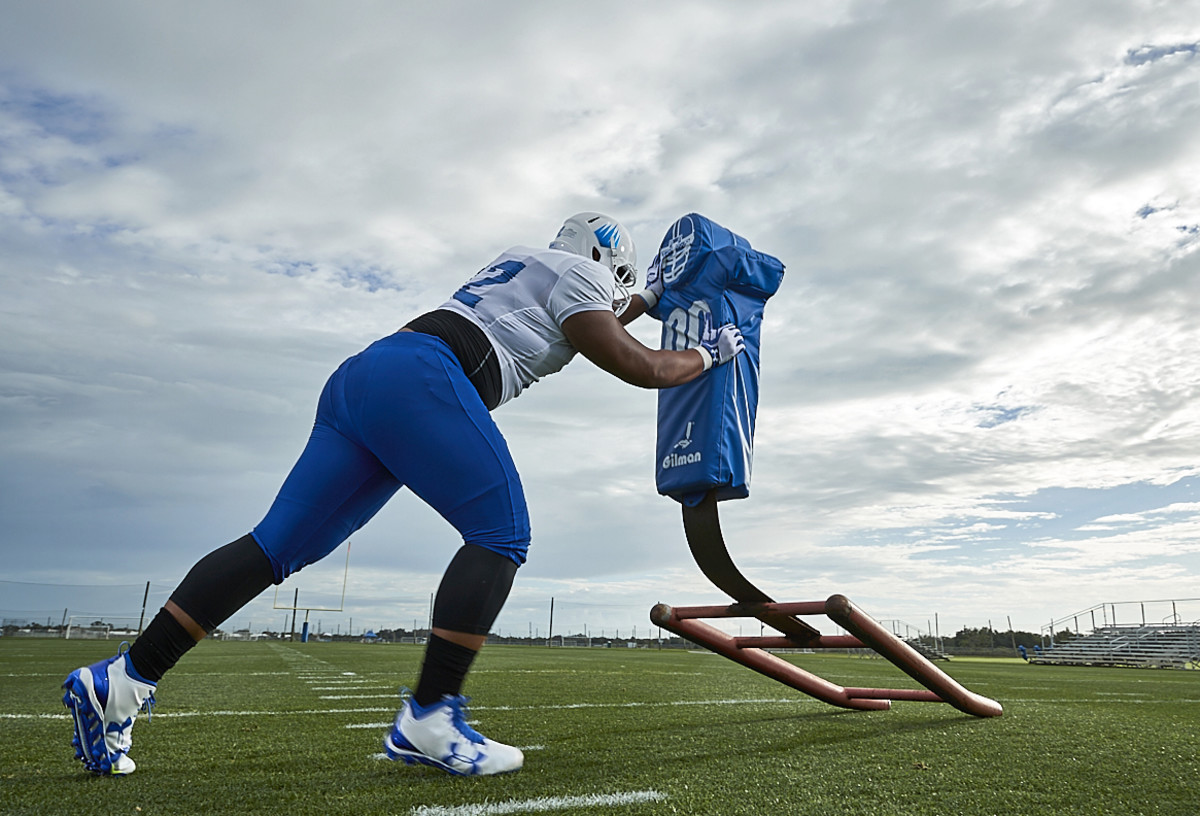
Daniel Faalele
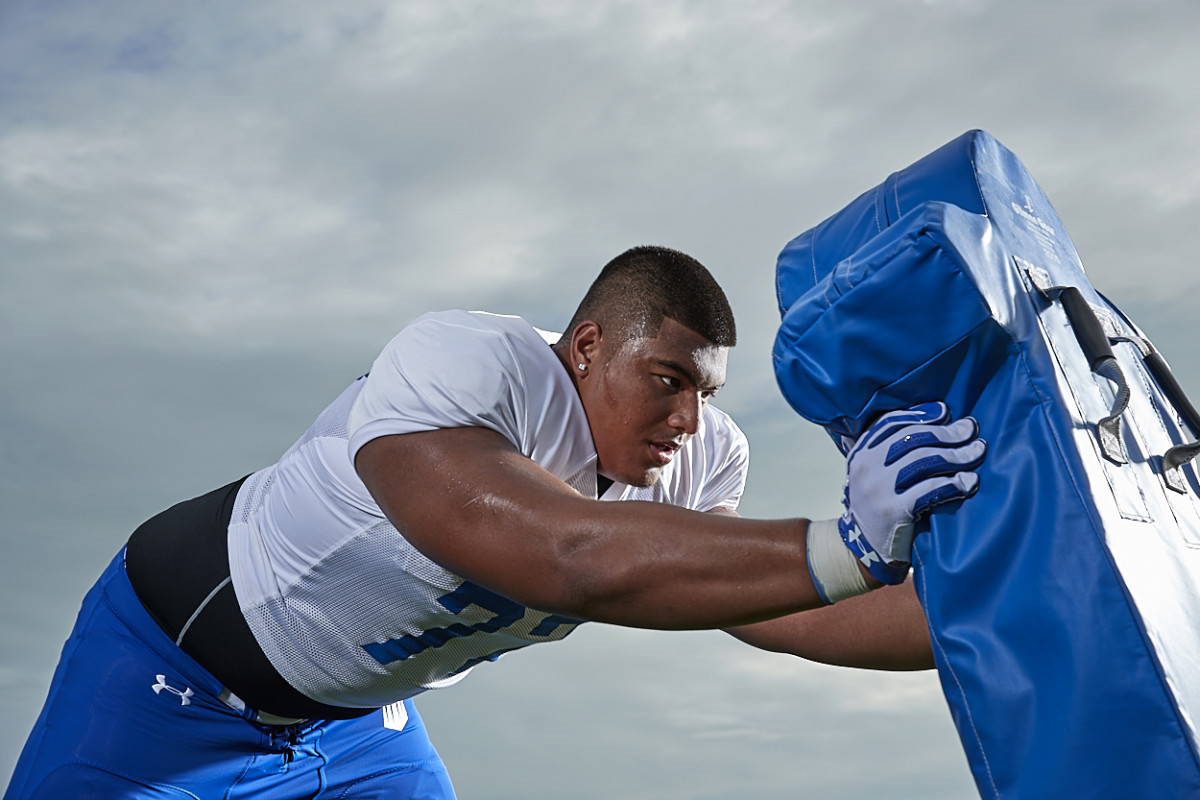
Daniel Faalele
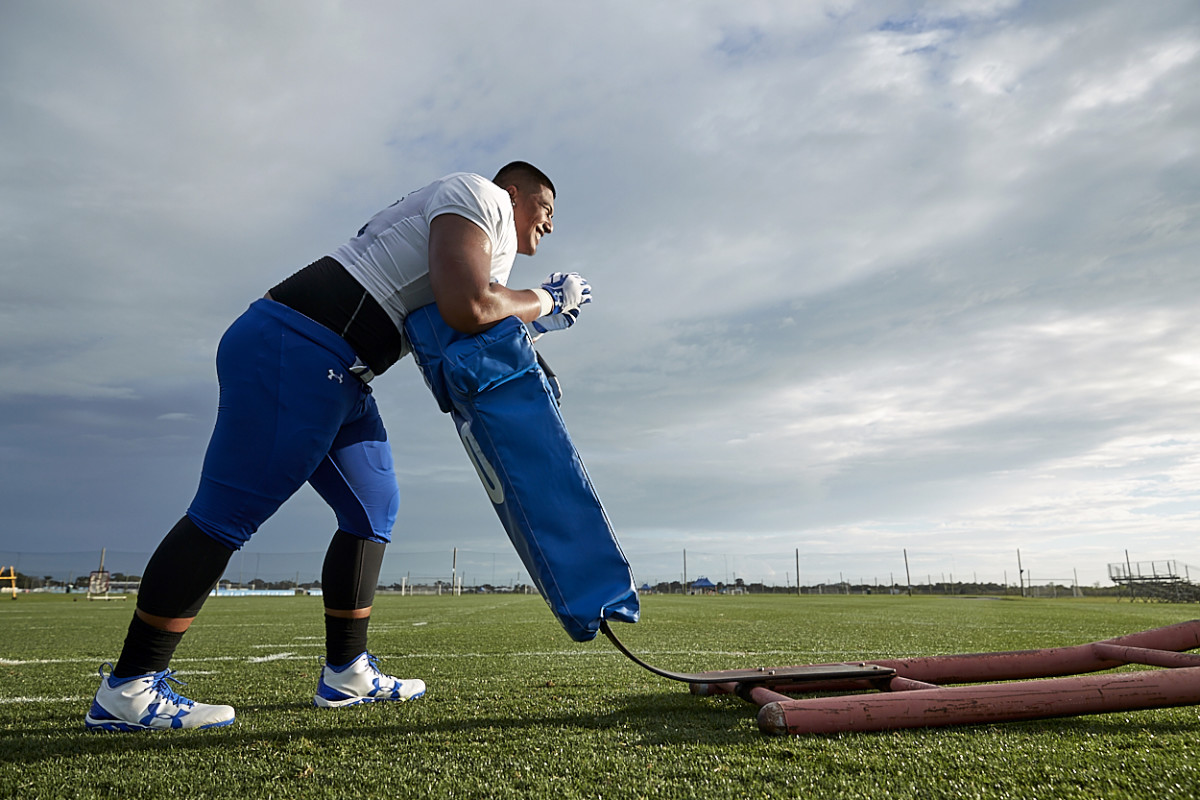
Daniel Faalele
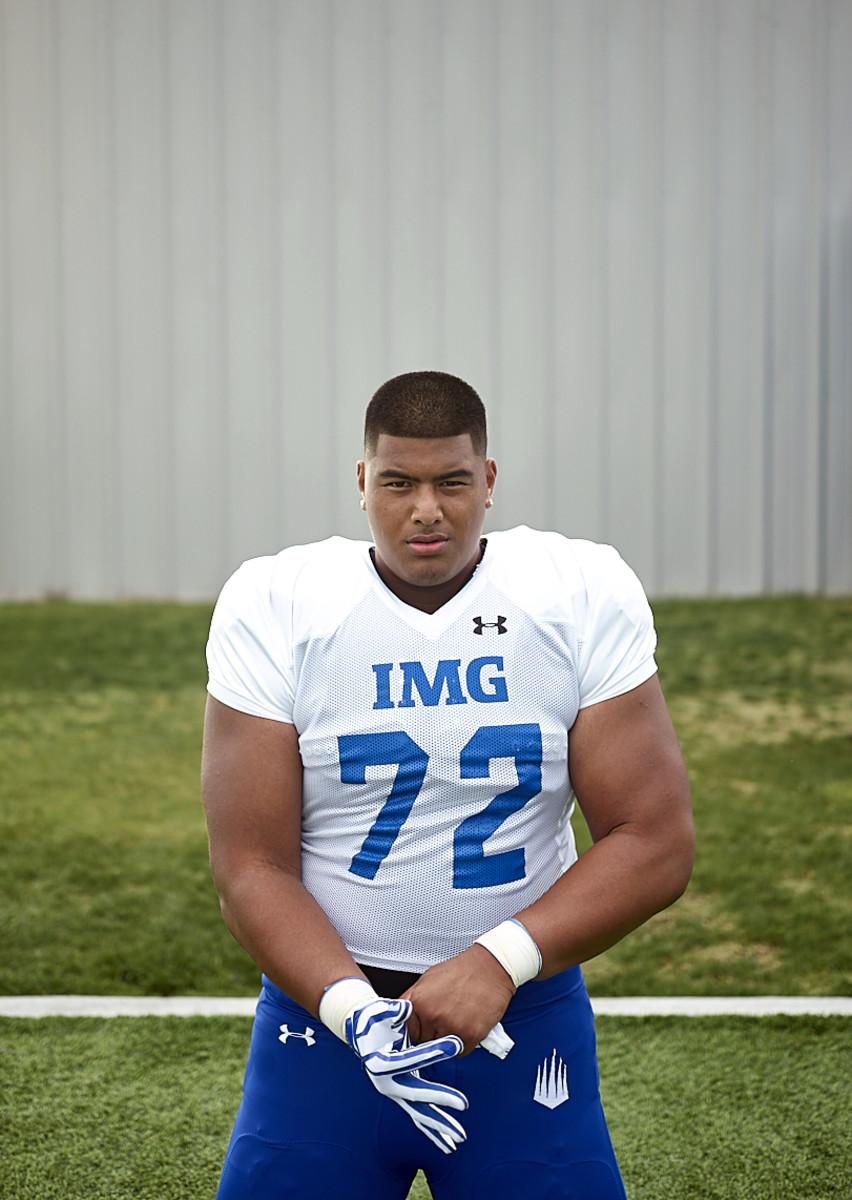
Daniel Faalele
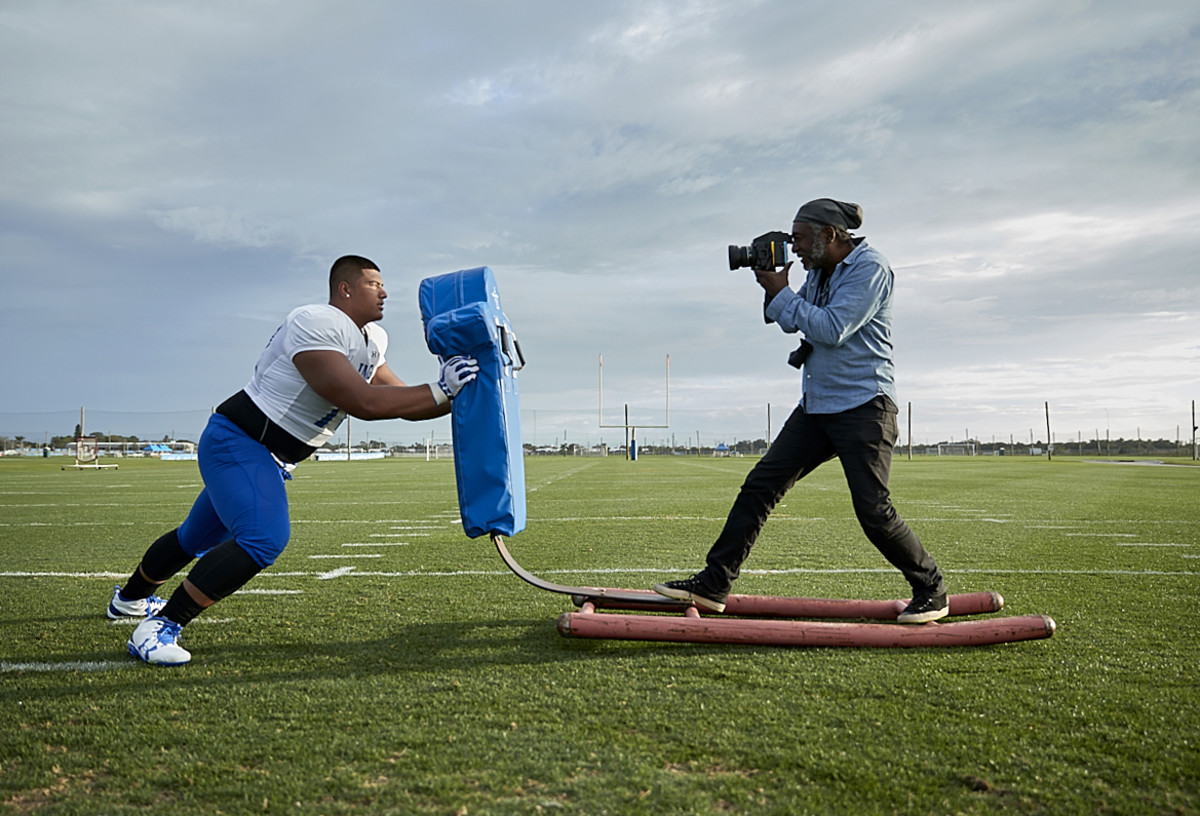
Daniel Faalele
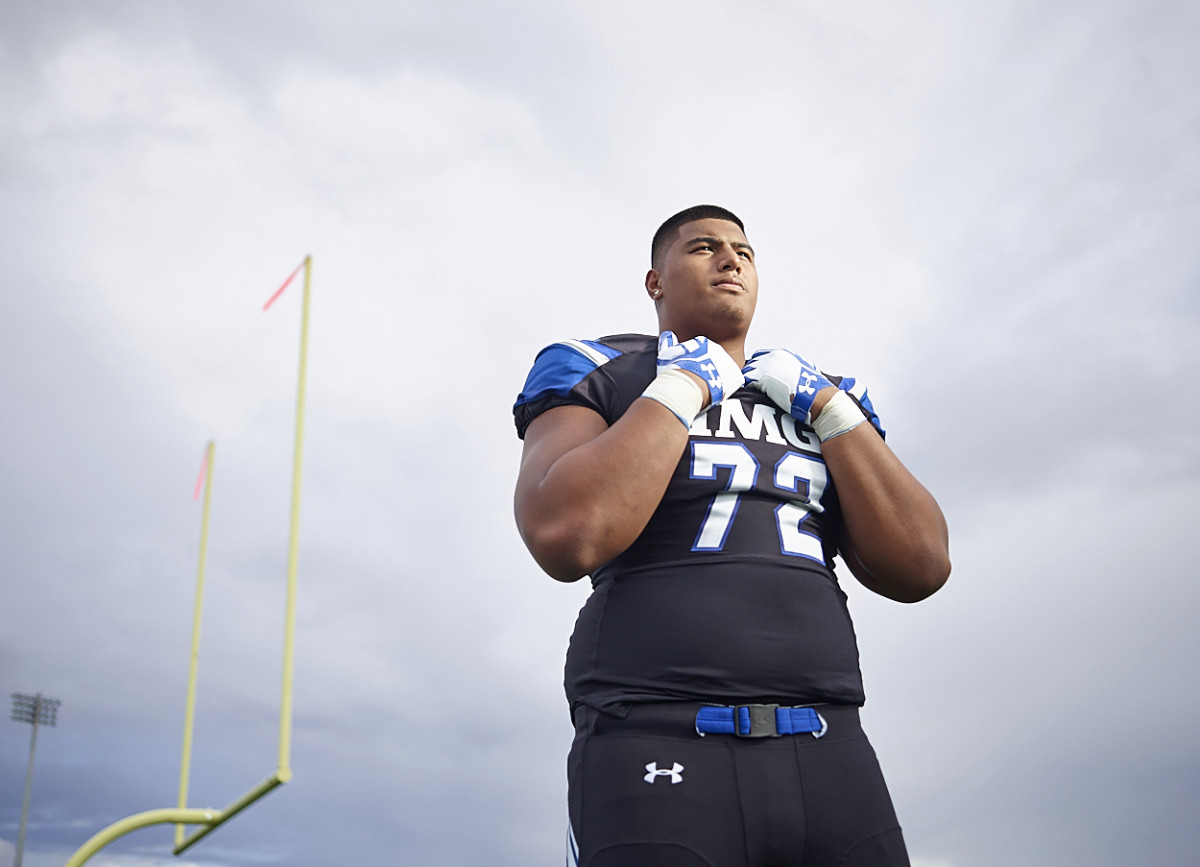
Daniel Faalele
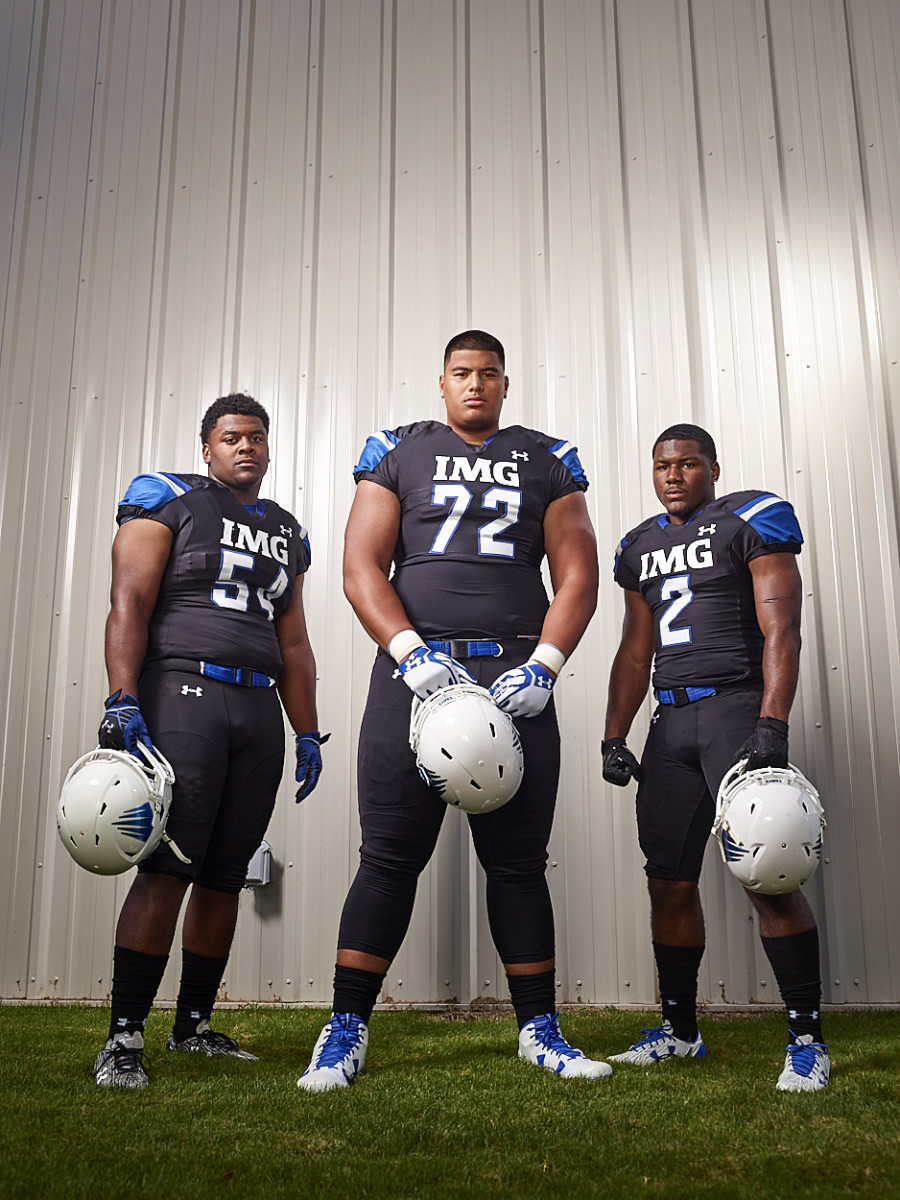
Daniel Faalele
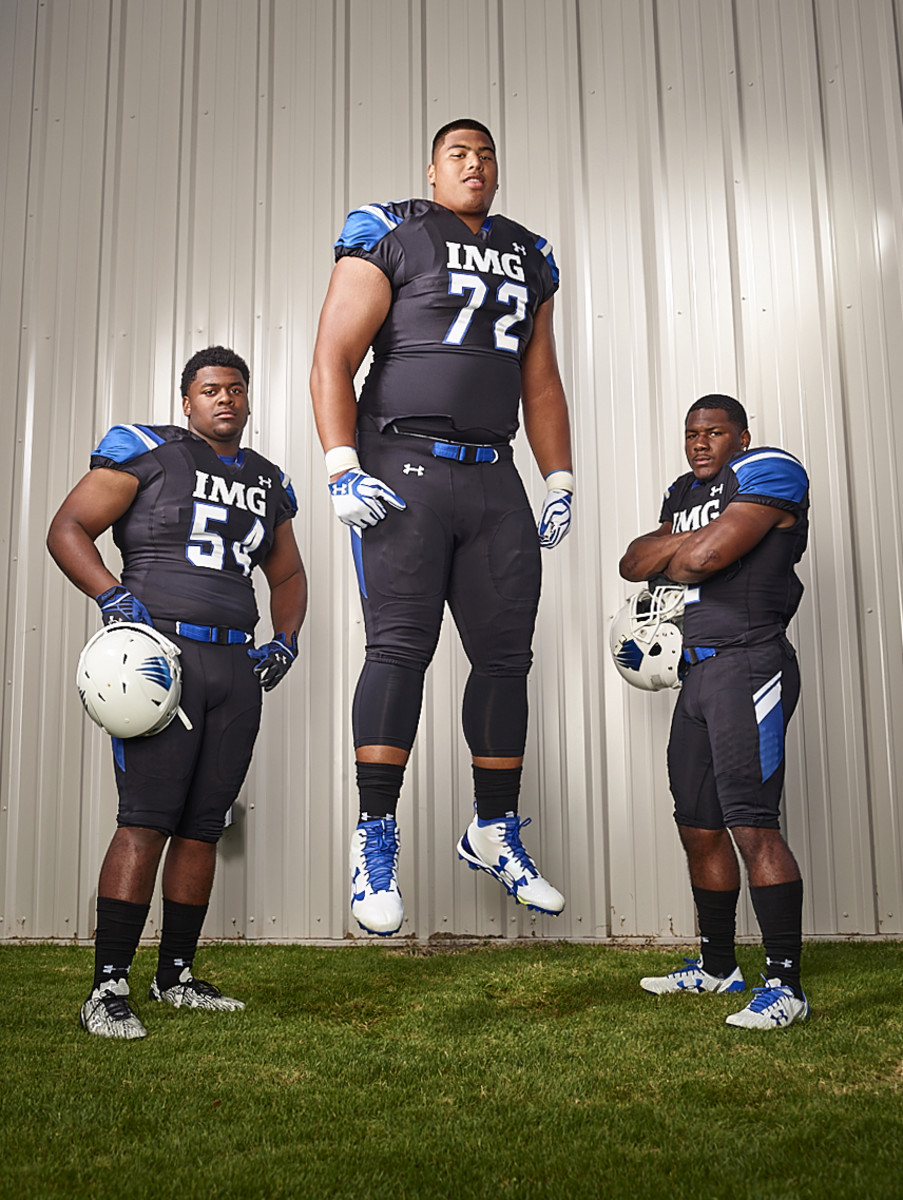
Daniel Faalele
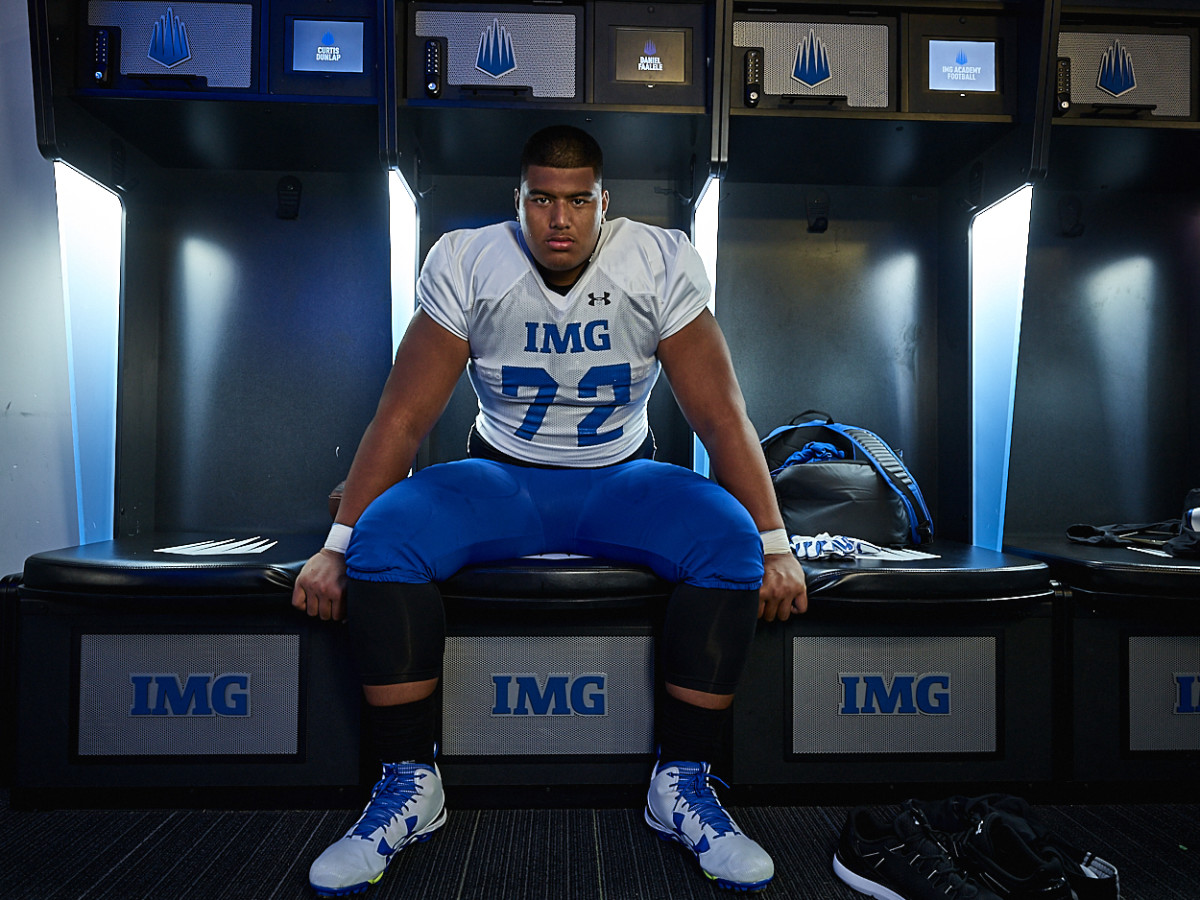
Daniel Faalele
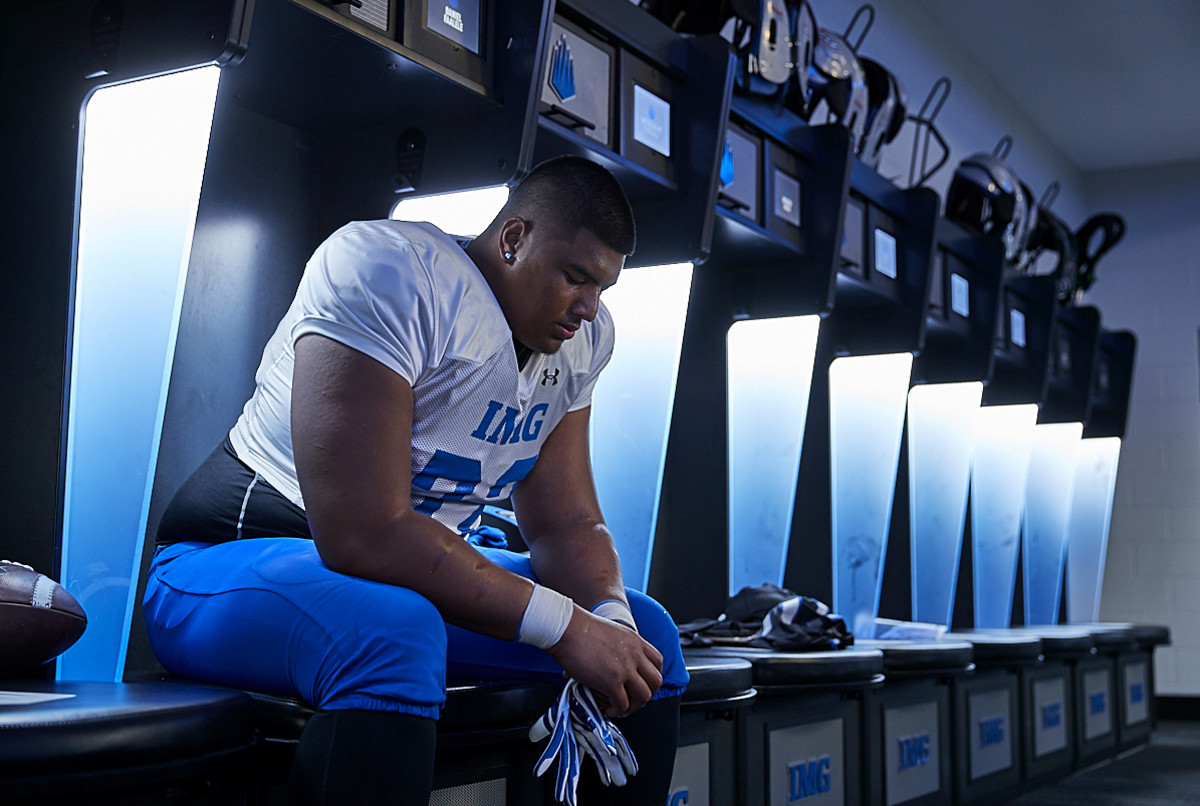
Daniel Faalele
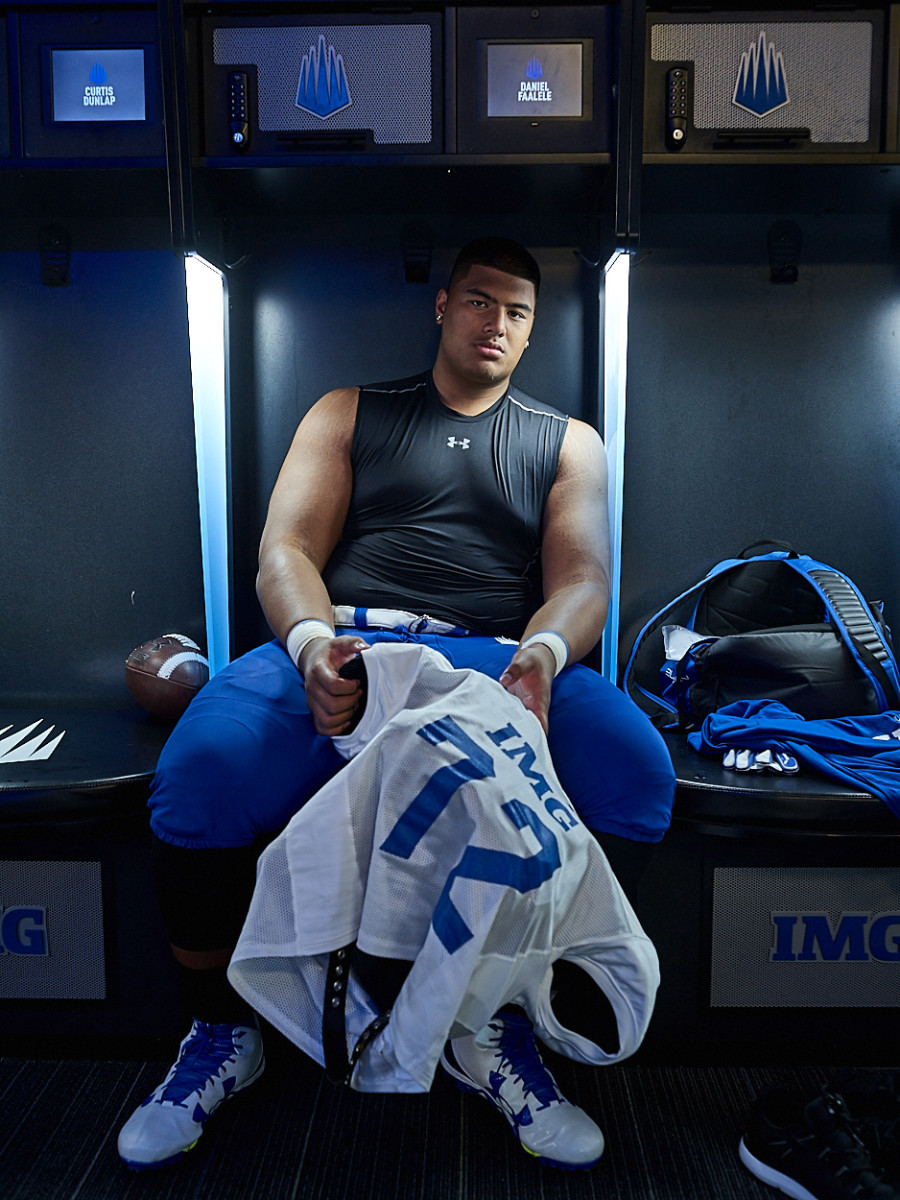
Daniel Faalele
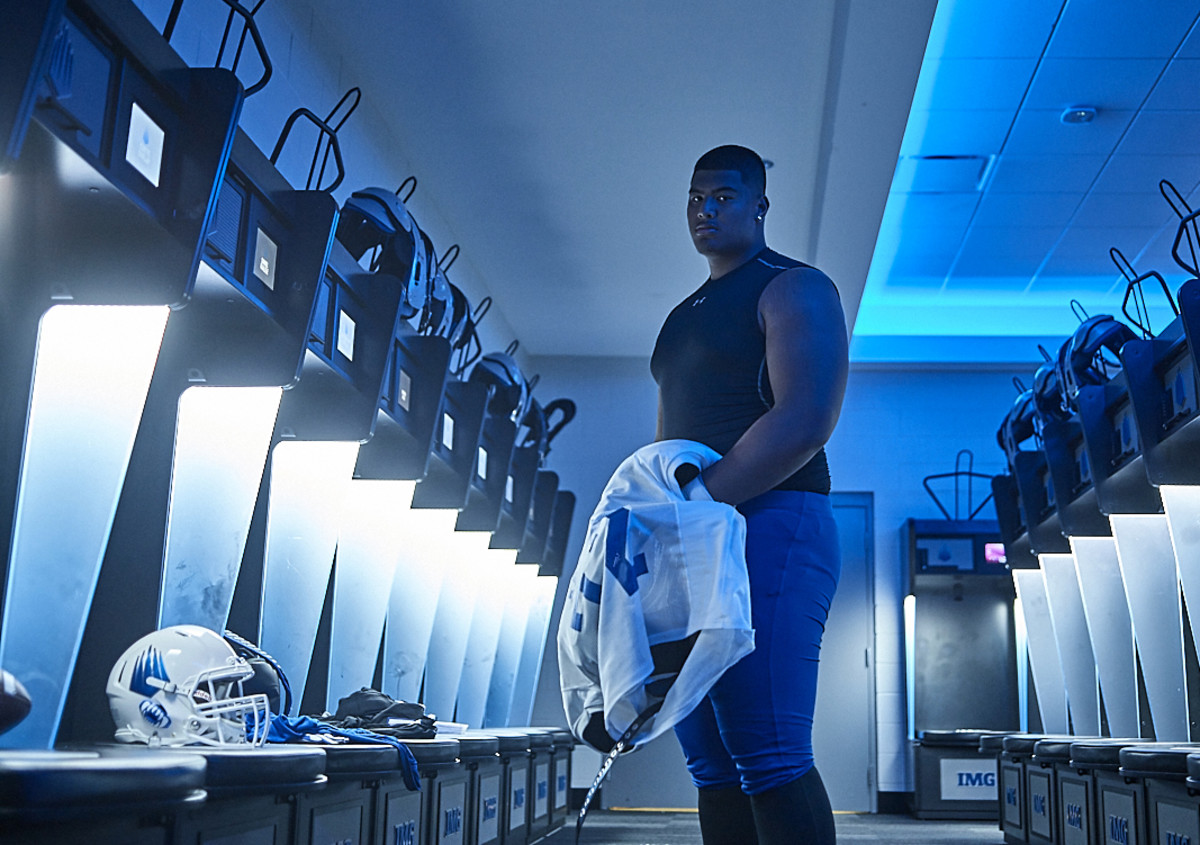
Daniel Faalele
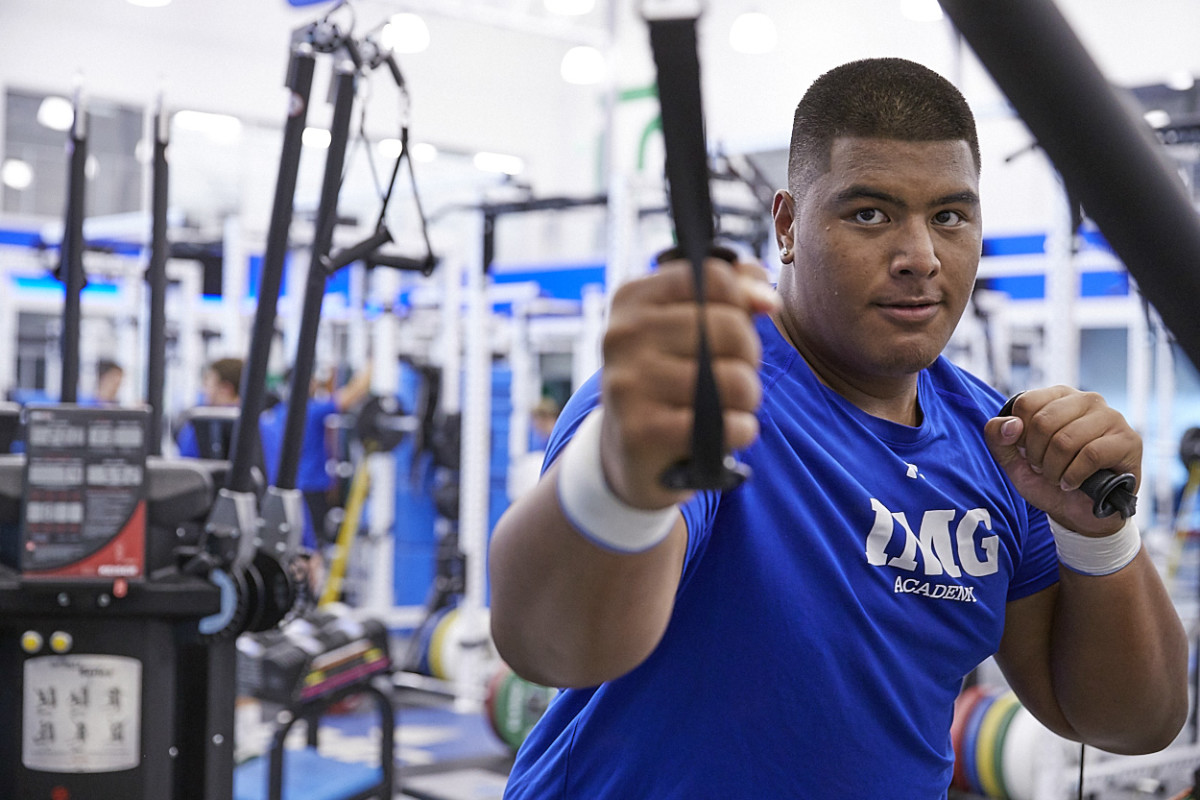
Daniel Faalele
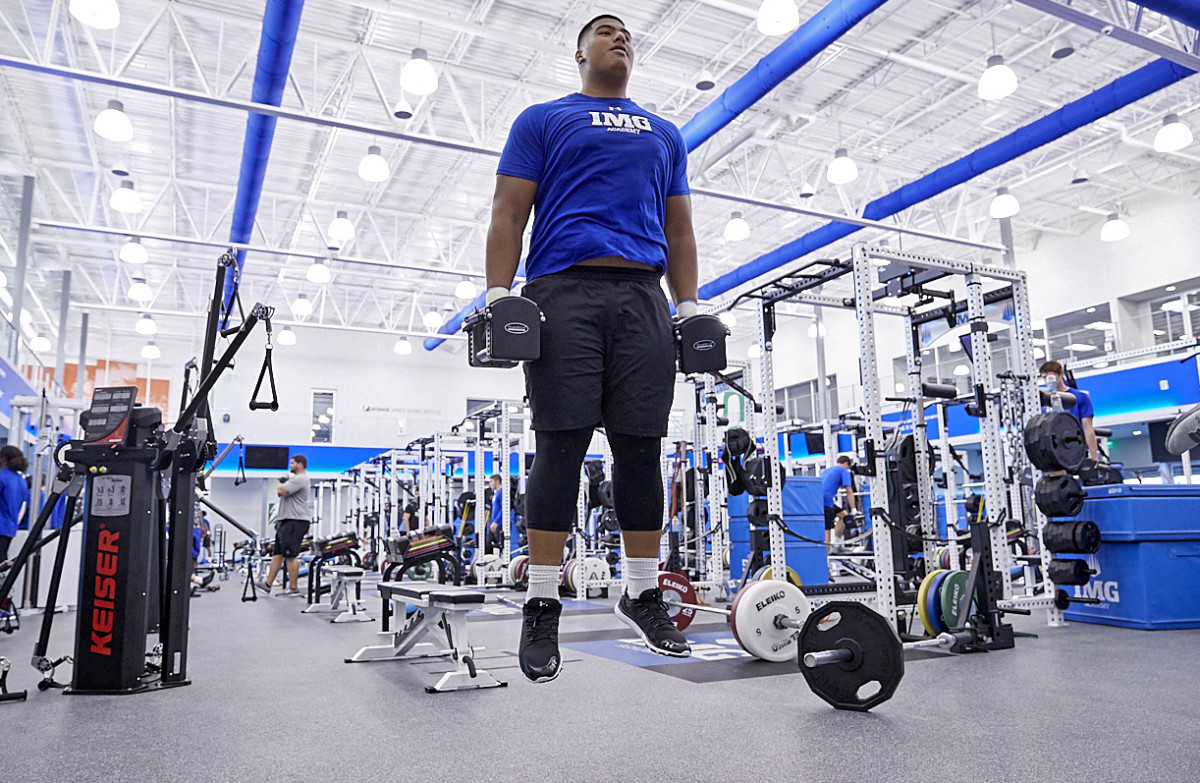
Daniel Faalele
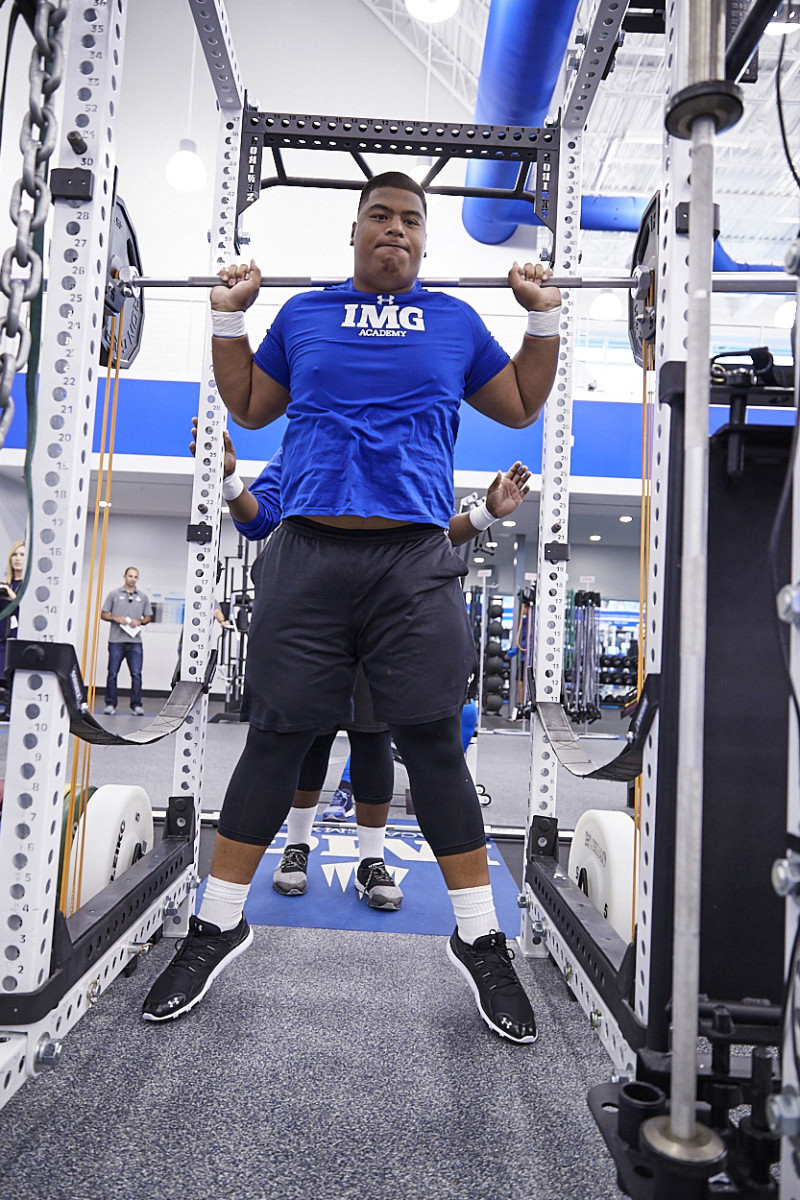
Daniel Faalele
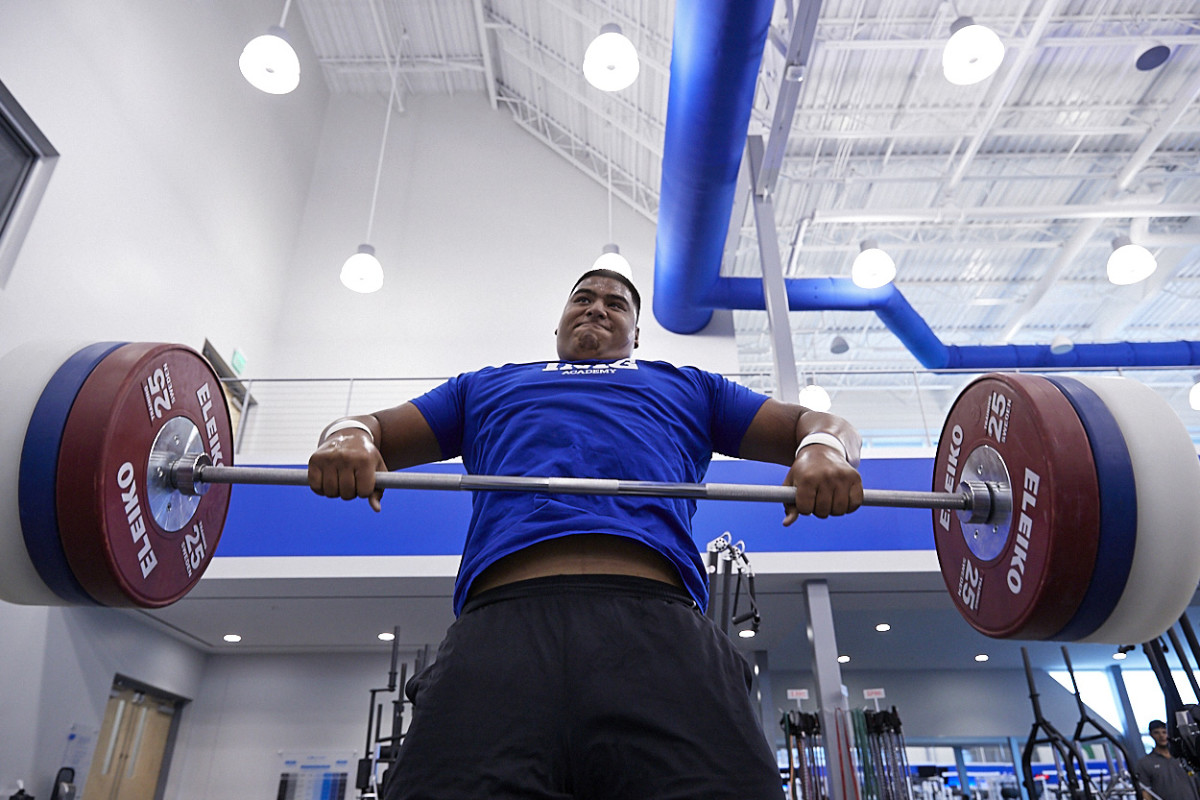
Daniel Faalele
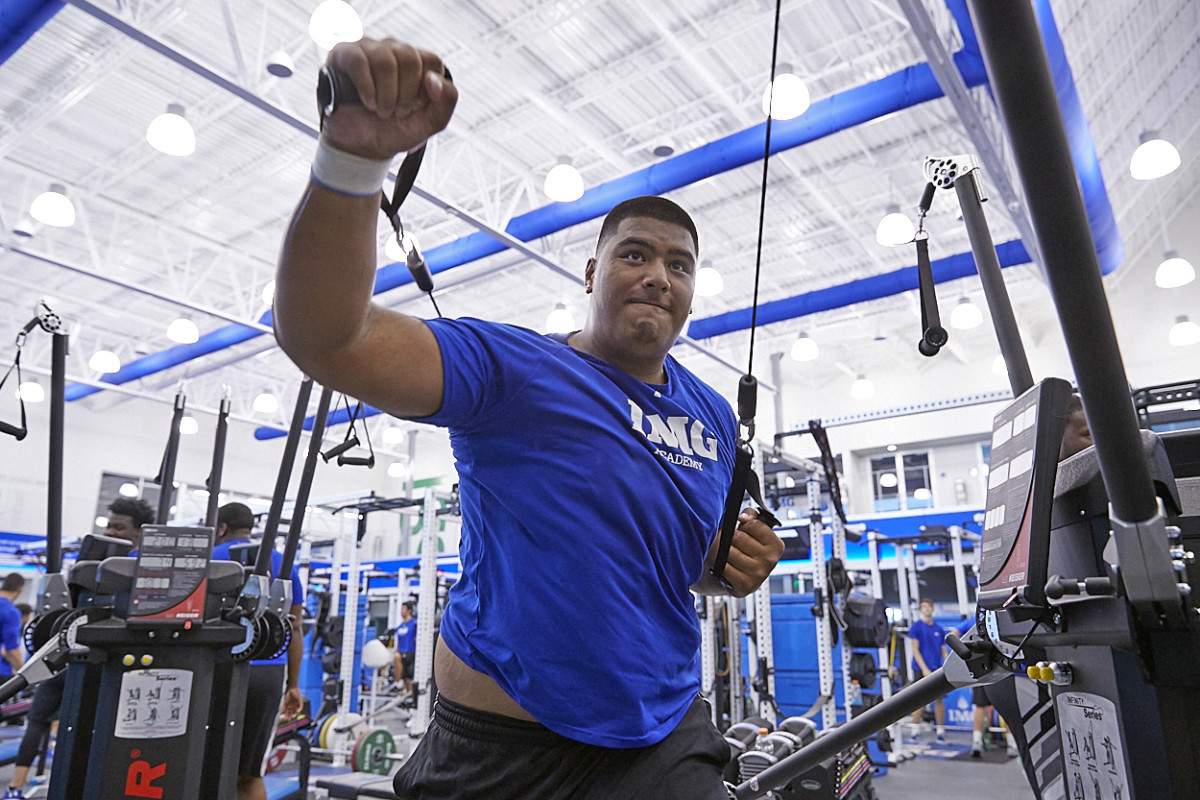
Daniel Faalele
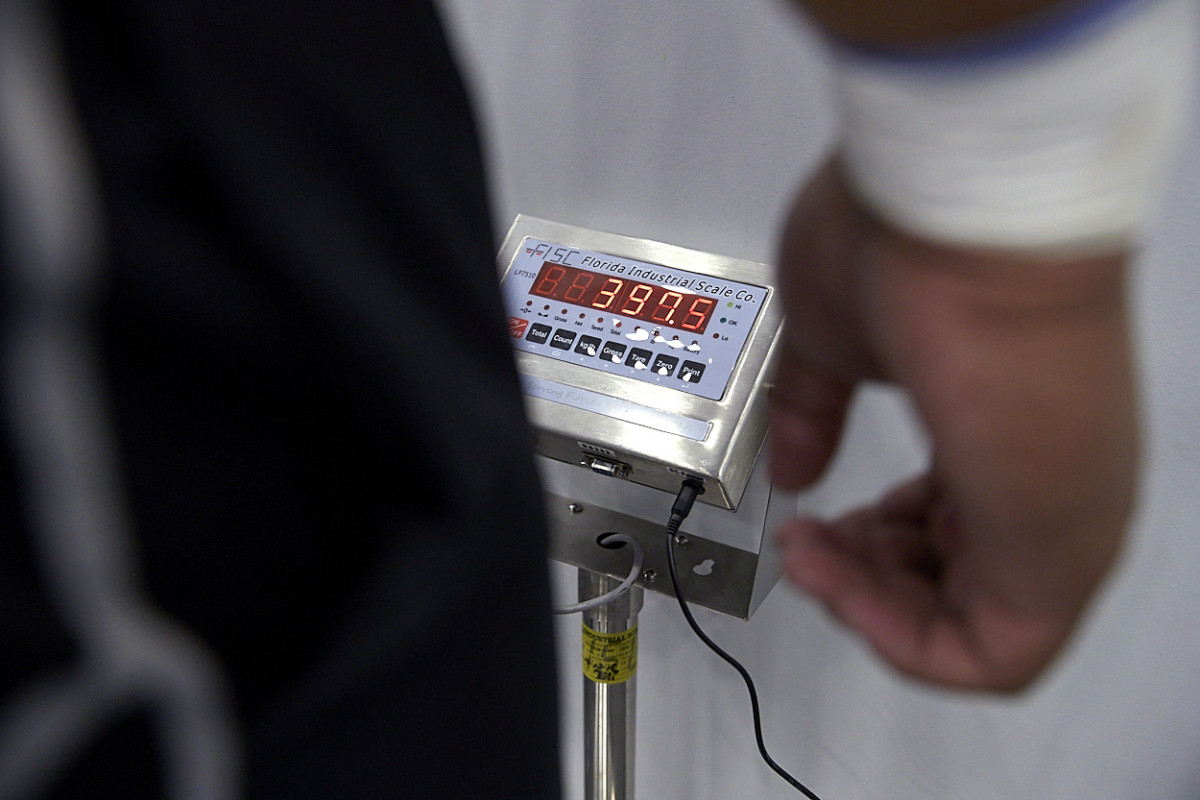
Daniel Faalele
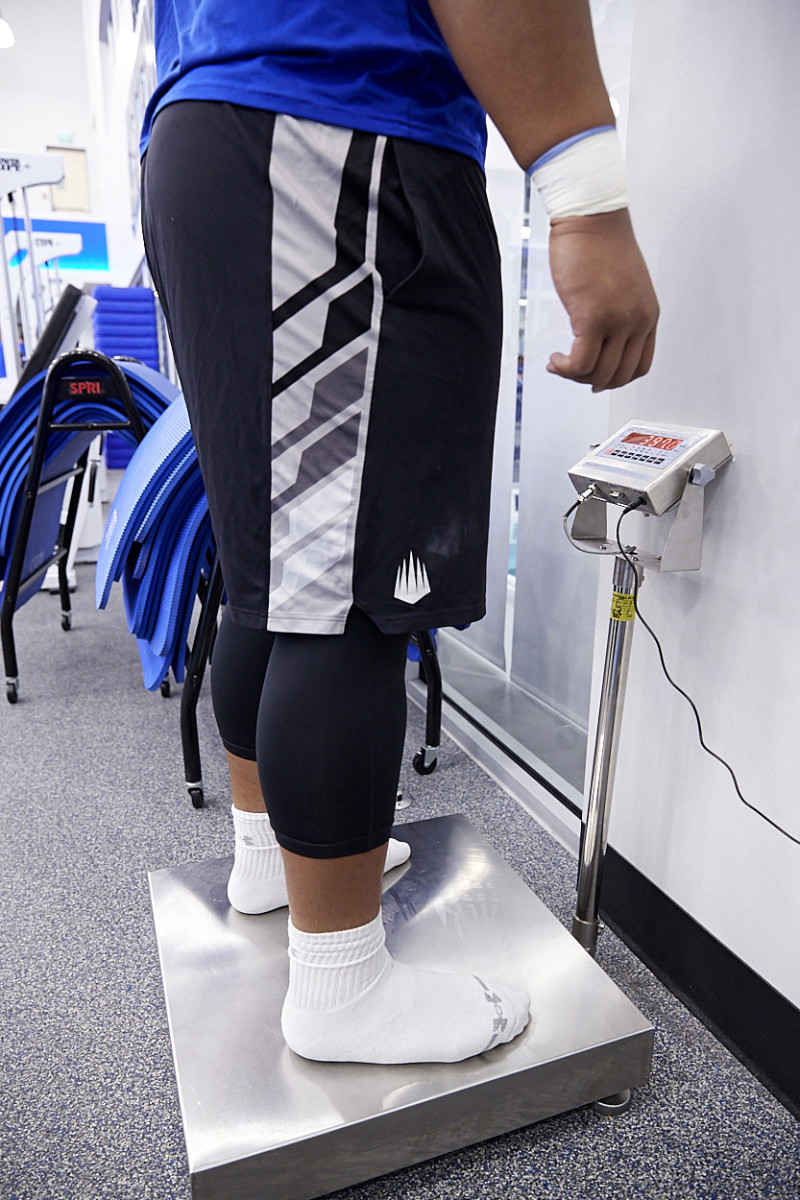
Daniel Faalele
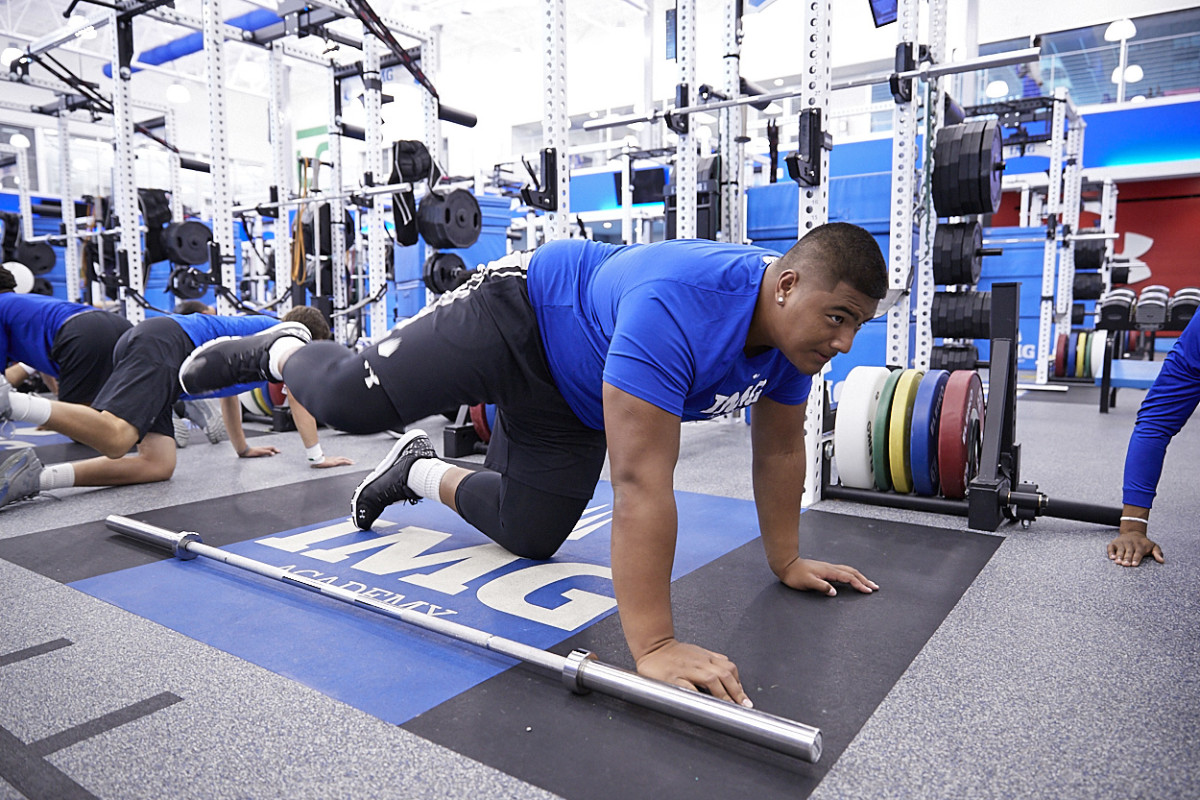
Daniel Faalele
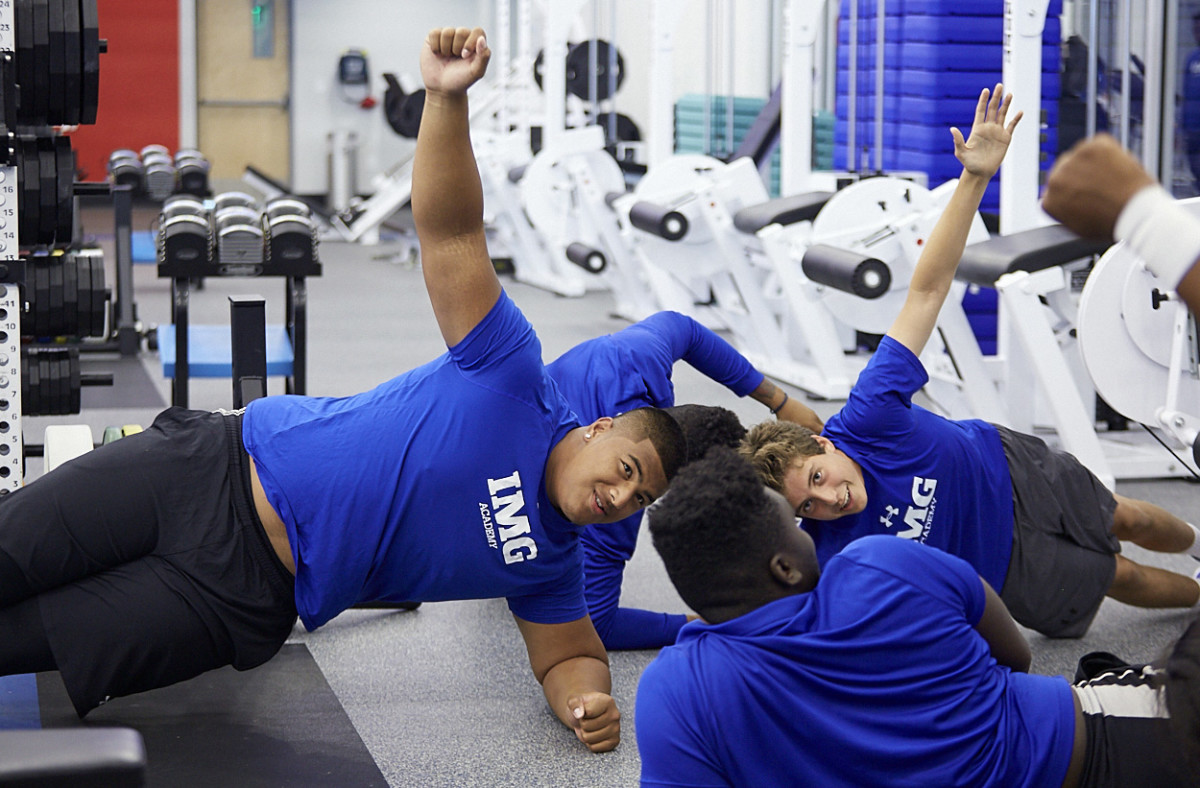
Imagine growing up in Atlanta or San Antonio or Fresno and, at 16, being told that you have attributes that could make you the ideal cricket bowler. Then imagine moving to England or India to train with some of the best cricket players in your age group. That, essentially, is what Faalele has done with football. In 2015 a Hawaii assistant saw Faalele lifting weights at a gym in his native Melbourne and offered a scholarship. Faalele didn't know anything about American football, but the idea of a free education and a potential professional career intrigued him. He had grown up playing rugby then shifted his focus to basketball, though he wasn't sure how far that game could take him.
Rugby and basketball had given him agile feet, and he could bend as well as someone with a much lower center of gravity. An envoy from Michigan learned this last June, during a satellite camp outside Melbourne. Coaches put 133 players through agility drills and skills testing. Faalele ran and jumped, and he attempted a three-point stance for the first time. When the three-hour camp was over, he still didn't understand the game, but he had begun to grasp the future he could make for himself if he mastered it.
So Faalele and his mother, Ruth, began researching football. Learning the game quickly enough to earn a scholarship meant moving to the U.S.—but where? Also, Ruth had to come to terms with sending the eldest of her two sons to another continent. Daniel had always been big. "When he was four months old, he was wearing size four booties," Ruth says. At 12, he was 6 feet and 220 pounds. Ruth, a 5'6" accountant, is mostly of Samoan descent. Daniel's father, Symon, who's not involved in his son's life, is a 6'2" Tongan. "It is common for Polynesians to be tall, wide or solid," Ruth says. "But it's not common to be all three in one." At 16, Daniel was larger than 99% of the men on the planet, but he was still her baby.
With most players at NFL combine, Harbaugh model for Michigan continues to prove its worth
IMG is set up along the lines of sports institutes in Australia. When Ruth asked Wright if the academy had a bed big enough to hold her son, he brought up current NBA D-leaguer Satnam Singh. "We just had a kid from India who was 7'2"," Wright said. "I know that bed is here someplace." About half of IMG's students come from other countries, and while the academy charges $75,200 a year for a boarding football player, Daniel would receive financial aid.
Last August he said goodbye to his family and flew from Melbourne to Sydney to Los Angeles to Tampa. More than 10,000 miles later he stood on that practice field in Bradenton with his new teammates surrounding him.
*****
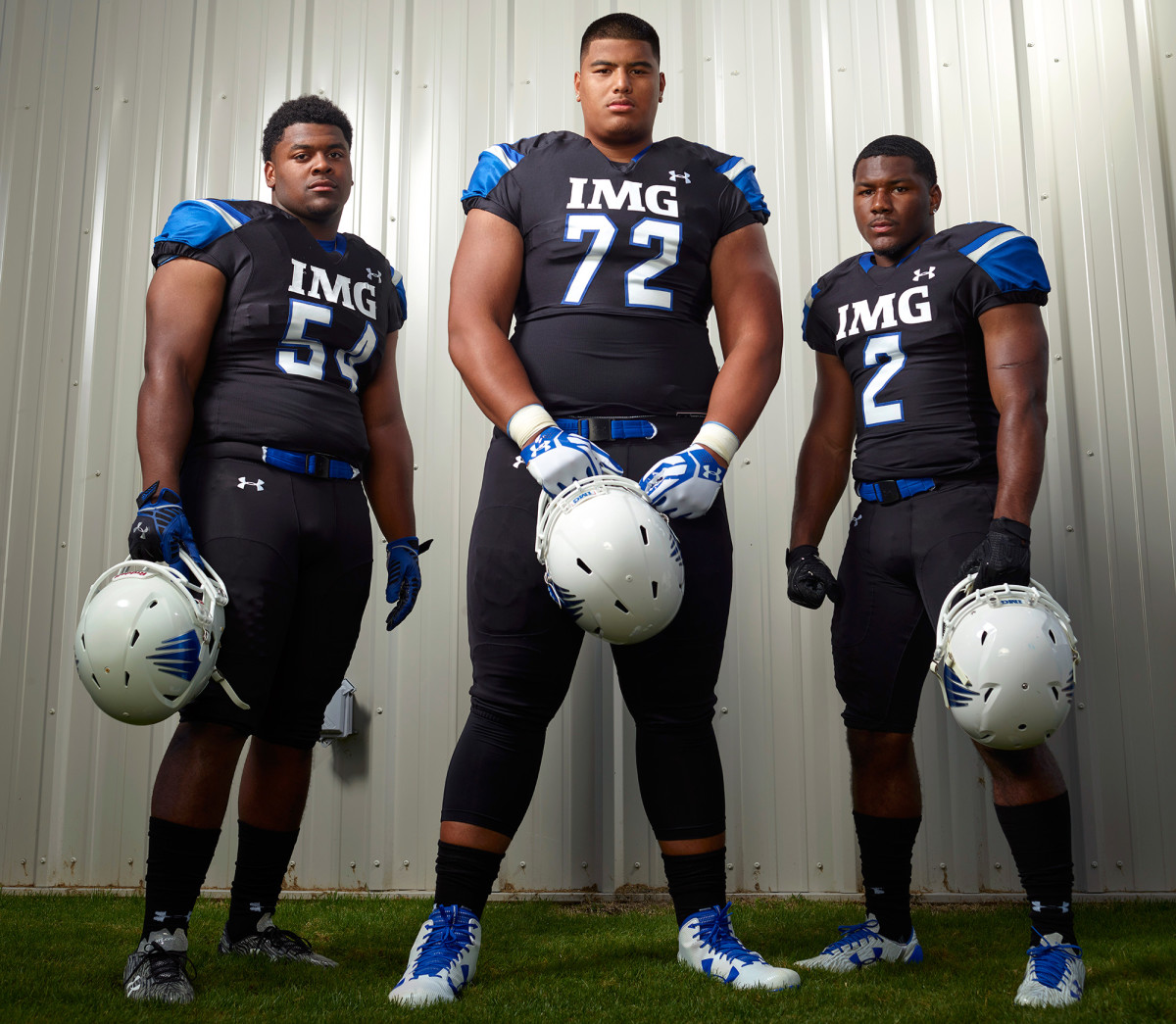
Faalele understood virtually nothing about football. "He didn't even know what a yard was," Dunlap says. About a week after landing, Faalele traveled with the Ascenders to Mission Viejo, Calif., where they faced Centennial High. It was the first game Faalele had watched from start to finish. On the bus afterward, players were stunned at his questions. Why are we kicking it to them? Why, all of sudden, does the other team give us the ball back?
With a learning curve so steep—it took him about 20 minutes that first day to put on his pads—Faalele and the coaches agreed that it would be better if he only practiced through his junior season so he could learn the sport. When Faalele talks about American football, he talks about "my dream." But the dream refers more to a better life for Ruth and his brother, Taylor (who, at 11, is already 6 feet and 260 pounds).
But plenty of large people try football and fail. Off the field Faalele tries not to intimidate with his size. He speaks softly. He treats others gently. Initially, Ruth and the coaches wondered if that might affect his play. Ruth says that as a child, Daniel would walk away when playtime got rough because he worried he might hurt his friends. That wouldn't work on a football field.
At practice Faalele erased any such fears quickly. During individual drills Elder had Faalele line up as a defensive tackle. "Guys were bouncing off him left and right," Elder says. Contact, it appeared, did not bother Faalele one bit. In fact, talking about slamming into opponents produces a smile and a chuckle and adds a little volume to Faalele's voice. "I love it," he says. "It just feels natural. It feels like an achievement to overpower someone else." On the football field Faalele never has to hold back. "Now, he's able to just release all that," Ruth says. "He must have been enclosed for so long. Now he's playing a sport where he can just explode. In fact, he's required to. That's why I think he's loving it."
In one of Faalele's early practices Elder taught him to punch the pass rusher with both hands, then grab his chest. During a one-on-one drill that day, Faalele fired his hands to disrupt the lineman's charge. Then one hand disappeared inside the rusher's shoulder pads and the kid went limp. Sensing something wrong, Faalele let go and backed away. "He had grabbed [the defender's] collarbone," Elder says, shaking his head at the memory. Elder clarified: Seize the chest plate of the shoulder pads. "His hands are steel," Elder says. "If he gets them on you, it's over. Doesn't matter if he has good technique or bad technique, it's over."
Still, a key question remained: Could Faalele develop enough technique to succeed in a game? The Ascenders would soon get another hint. Midway through the season Faalele was toiling on the scout team's offensive line. The play called for him to pull and hit the first unblocked man, which happened to be defensive end Josh Kaindoh. Coaches called Kaindoh, a Florida State commit, the Human Mannequin because at 6'6" and 255 pounds he looks like something Michelangelo might have chiseled. Unbelievable as it might seem, Kaindoh didn't see Faalele coming. Suddenly, the five-star recruit became a five-star projectile. Later Wright asked Faalele if he'd intended to send Kaindoh airborne. Faalele replied that the diagram had told him to eliminate the defender, and he had. The coaches smiled.
*****
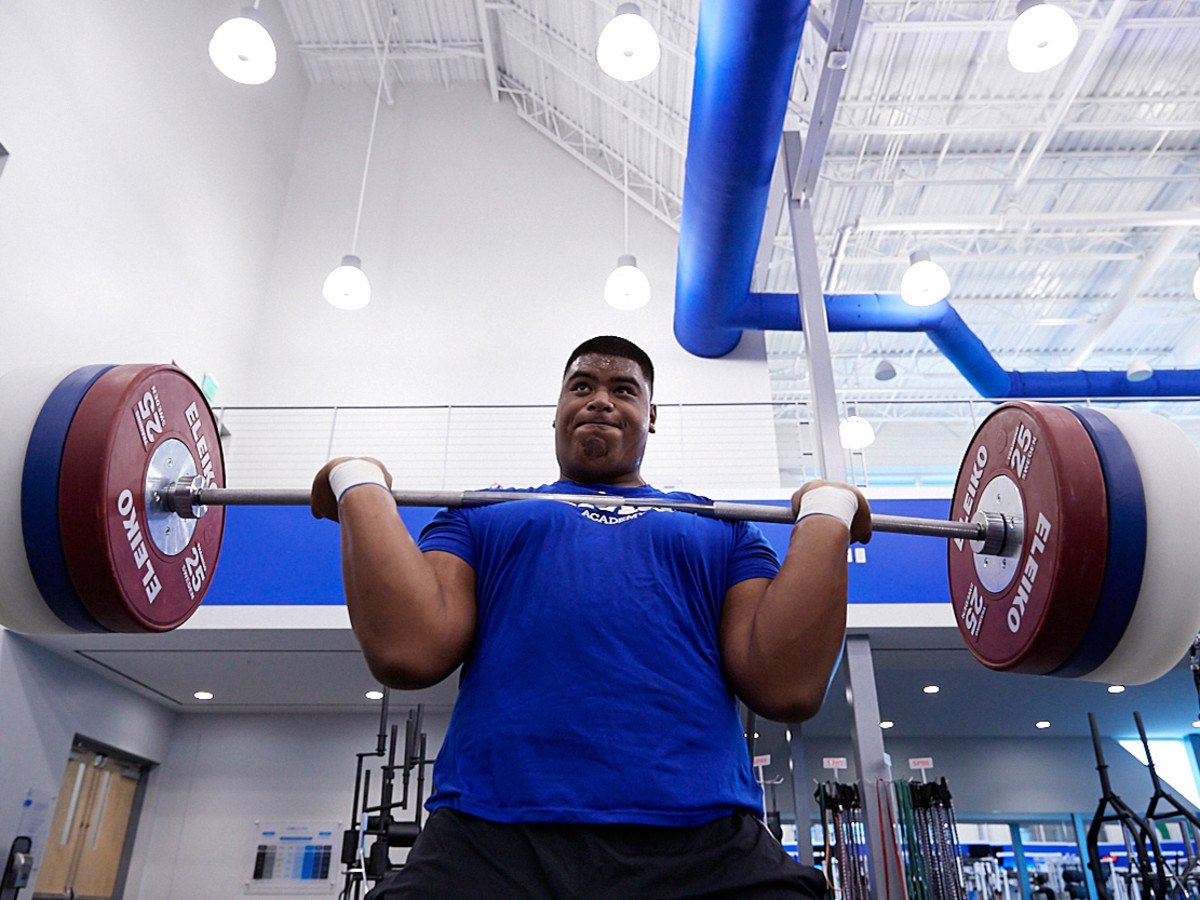
While the coaches dream of stacks of pancake blocks when Faalele suits up this August, IMG head of sports science Matt Rhea wonders if he needs to order new machines to accurately assess Faalele. Several Ascenders can bench press and squat more than Faalele, but he hadn't engaged in a serious strength program until he arrived at IMG, so his maximum lifts will soar. Rhea is far more interested in power, a measurement of force plus velocity. From day one Faalele's power stats have exceeded those of his teammates. "I was amazed at how fast he is for how big he is," Rhea says. "His lower body power is higher than anything I've ever measured." During a workout last month Faalele hit 2,429 watts while performing a test that involves simulating a shot put motion while using a cable machine. Rhea asked around and found that NFL players usually reach around 2,200 watts when doing that drill.
On the day of the test Faalele weighed 396 pounds. Coaches and teammates assume Faalele will need to slim down, but weight is only a number for Rhea. He is concerned with Faalele's muscle mass compared to his body-fat percentage. Faalele is leaner than many of his fellow offensive linemen, and he'll likely get leaner while packing on more muscle. And since muscle weighs more than fat, it's possible his ideal playing weight might be above 400 pounds. Rhea's biggest concern is that those working with Faalele maximize his gifts—because they'll probably never see another human being like him. "The pressure is on us," Rhea says. "The support structure around him here and at his college needs to do right by him."
Wright and Elder feel that pressure too. Faalele has the temperament and the work ethic; it's up to the coaches to teach him the game. So far he's learning. In Elder's meeting room Faalele can describe everyone's duties on inside zone. During a team chalk-talk session last month, Wright made Faalele explain the Ascenders' five-man pass protection scheme to his teammates. The explanation was nearly perfect. "He came in as a ball of clay," Elder says, "and now he's starting to get sculpted into that football player."
Yet it won't matter how huge Faalele is or how much power he can generate if he can't perform as a player. By the time he makes his debut, he'll be one of the nation's most sought-after offensive line prospects. The boy the size of two men, who traveled 10,000 miles to play a strange game, believes he's ready. "I can't wait," he says. "I can't wait to hit someone else."
